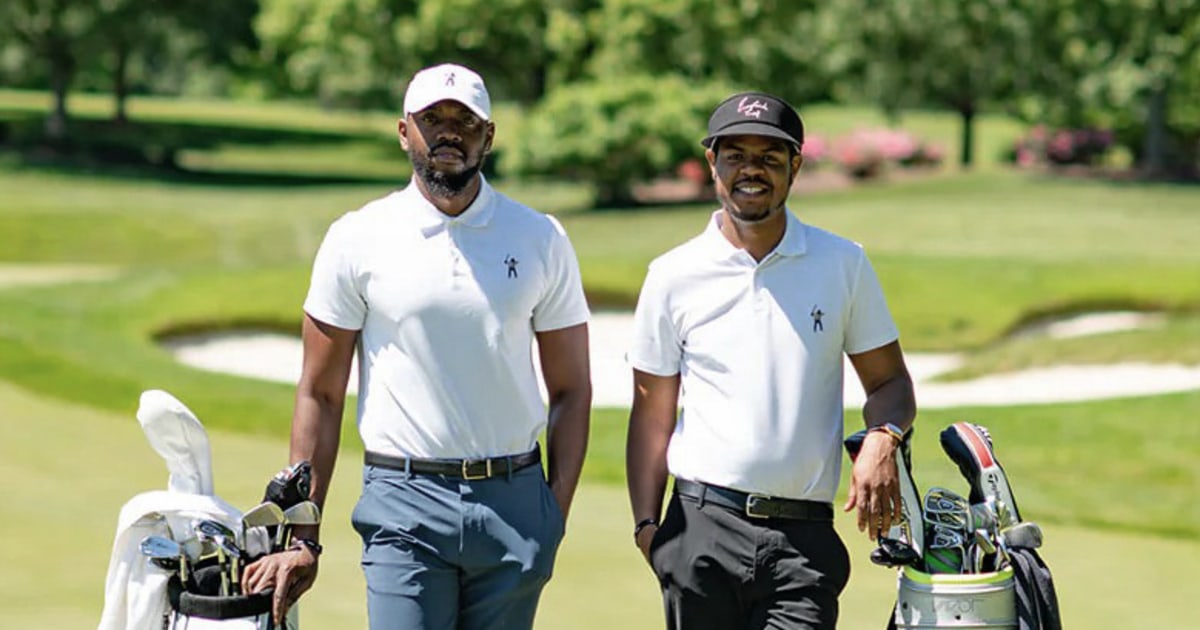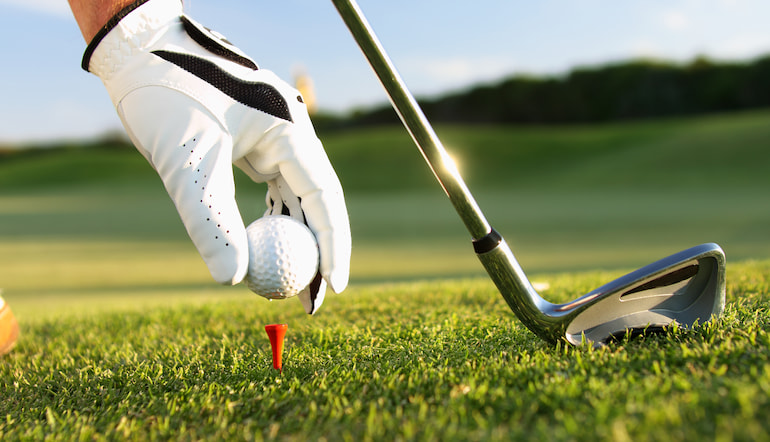He grew up on the Eastside of Atlanta, a majority African American community in a predominantly Black city, and learned to golf at 6. He was surrounded by Black kids, Black parents and Black coaches at his neighborhood’s public courses. It wasn’t until Ajanaku’s first tournament in grade school that he realized his own experience was unique.
“I thought that golf looked like where I was from,” said Ajanaku. “But then you get out there and you go to these tournaments, you see it’s a whole different world.”
Due to the high startup costs of the game, limited access to golf facilities and a lack of exposure, Black participation in the game has traditionally lagged. A 2019 National Golf Foundation report found that only 3% of recreational golfers were Black. And at golf’s highest level, just four Black golfers have PGA Tour status out of more than 200 players, and zero LPGA Tour players are Black
That’s why, in 2019, Ajanaku and his best friend and former Morehouse College golf teammate, Earl Cooper, founded Eastside Golf, a lifestyle golf apparel brand with an unapologetic nod to Black culture. The brand’s logo, named “Swingman,” features a Black man wearing blue jeans, white sneakers, a baseball cap and a gold Cuban link chain necklace while swinging a golf club.
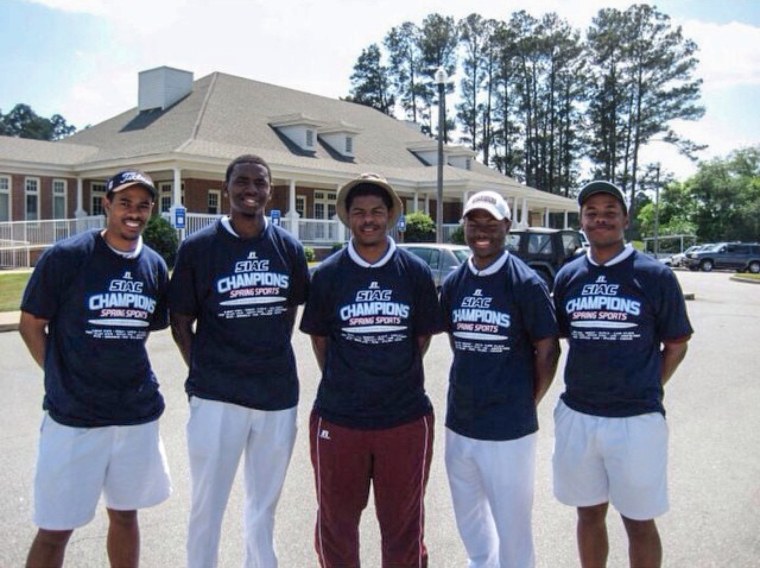 Olajuwon Ajanaku, second from left, Earl Cooper, third from left, and other former members of the Morehouse College golf team after winning the Southern Intercollegiate Athletic Conference Golf Classic in 2010.Eastside Golf
Olajuwon Ajanaku, second from left, Earl Cooper, third from left, and other former members of the Morehouse College golf team after winning the Southern Intercollegiate Athletic Conference Golf Classic in 2010.Eastside Golf
“I was literally just trying to make myself into a logo and express how I felt out on the golf course,” said Ajanaku, who played professional golf for a brief stint after college but was unable to secure enough sponsorships back then to make a career out of it. “I want to feel like myself, but I want to continue to play the game that I love.”
With polo shirts featuring the brand’s name in oversize script writing, bucket hats in various pastel colors and golf shoes with the Swingman logo replacing the famous Jordan Jumpman imprint (thanks to a coveted Jordan Golf collaboration), Cooper and Ajanaku say the goal of the brand is to change the perception of golfers while bridging fashion and the fairway.
“Oftentimes in golf, we worship exclusivity,” said Cooper, referring to how the game is generally relegated to private country clubs with membership fees that by default exclude many people.
“Our brand is for the masses.”
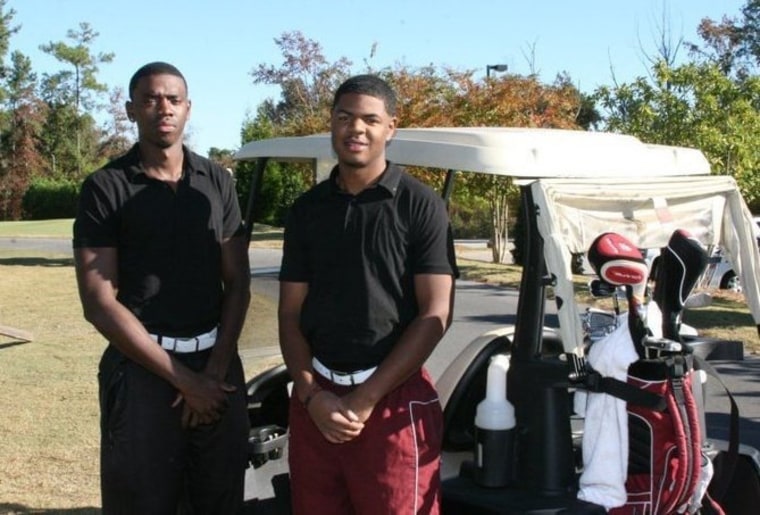 Olajuwon Ajanaku and Earl Cooper in 2011.Eastside Golf
Olajuwon Ajanaku and Earl Cooper in 2011.Eastside Golf
In 2024, Cooper said, Eastside Golf surpassed $10 million in revenue, up from $1 million in 2020. But it’s not all about bringing in money. Eastside Golf, Cooper said, has donated thousands to their alma mater, Morehouse College, where they graduated 15 years ago. They also sponsor college golfers, have signed Joseph Bramlett — one of the four Black PGA Tour-status golfers — and employ a diverse staff of nearly two dozen people. They can tally a range of celebrity ambassadors, including music producer DJ Khaled and actor Anthony Anderson, and brand partnerships with Beats by Dre and the Atlanta Braves, among others, plus a Sprite commercial and brick-and-mortar stores in Detroit and Tokyo.
But much of Eastside Golf’s work is about reaching everyday golfers, too.
“One of the reasons why I play golf is a little soft act of rebellion, showing that we’re here, we can play it athletically and mentally,” said Brittany Christian, a Black woman from Georgia who credits Eastside Golf with building bonds between Black golfers. “It means a lot.”
For the last two years, Eastside Golf has hosted “Community Days” in major cities like Dallas, and Chicago, where it buys out an entire golf course for the day and offers free tee times, food and music — and of course golf lessons. The events are open to everyone, but the overwhelming majority of attendees are African Americans.
“We’re here to show that golf is about accessibility, not only to the golf course itself, but to people,” Ajanaku said. “And that’s the strength of what golf is.”
At the most recent Community Day in early August, a crew of five preteen boys (and their dads) joined more than 300 players at the Charlie Yates Golf Course in Atlanta. Three out of the five shot up a hand when asked who was the best golfer.
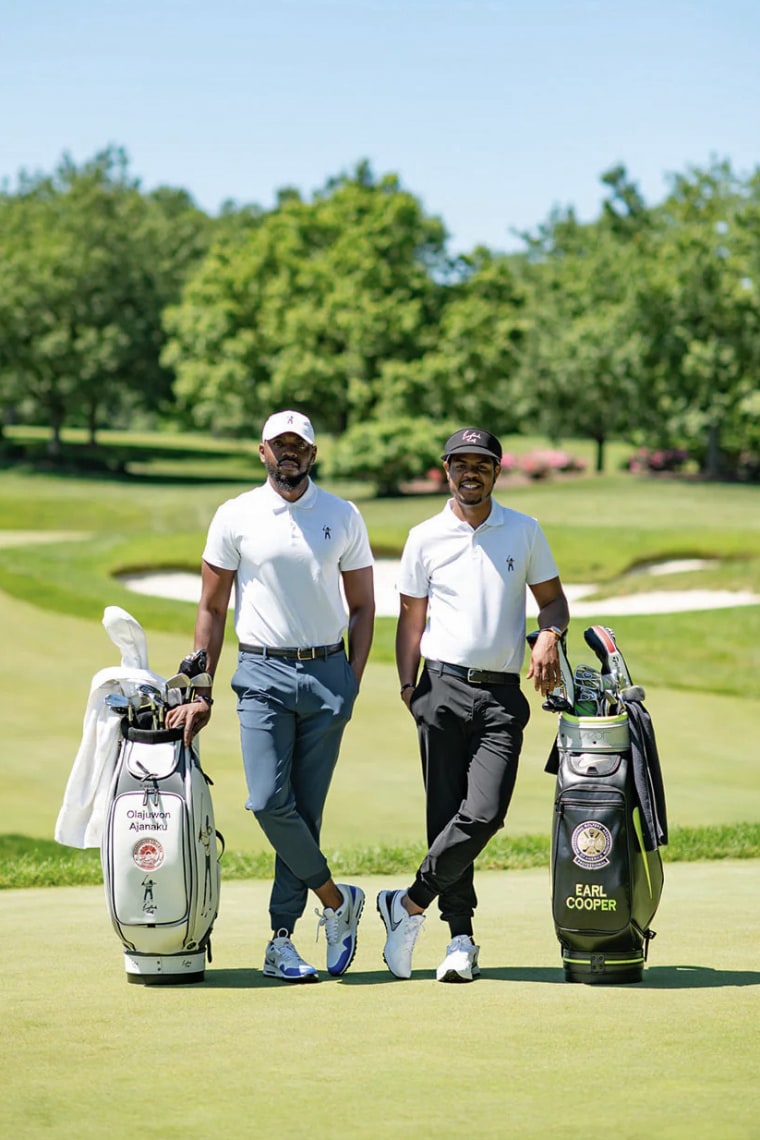 Eastside Golf co-founders Olajuwon Ajanaku and Earl Cooper.Eastside Golf
Eastside Golf co-founders Olajuwon Ajanaku and Earl Cooper.Eastside Golf
Thirteen-year-old Jacob Smith, who’s been golfing since age 2, said golf teaches him lessons that he’s able to apply every day.
“You can always bounce back,” he said. “If you hit one bad shot, the next shot could always be great.”
Mason Madison, 11, who started golfing three years ago, said golf is “honestly more than fun. There’s also the part where you’ve got to put in the work to get better, so it could be funner.”
The energy around these events, for Ajanaku, is reminiscent of the environment where he first learned the game he’s still in love with today. It’s inclusive, diverse and open-minded — but historically, that’s far from the norm.
“The way golf is set up — and you look at how it was then and how it is now — it follows the pattern of racism in the United States,” said Ramona Harriet, a Black golf historian and the author of “A Missing Link in History: The Journey of African Americans in Golf.”
Black golfers in the U.S. were historically barred from the game in many spaces. After golf came to the U.S. from Scotland by the 1700s, it evolved into a sport for country clubs, where Black people were prohibited from membership. In the U.S., Black golfers were relegated to caddy roles through the 1980s, many using their expertise to help white players become champions. The PGA Tour maintained its “Caucasian-only” membership clause until 1961, while some private clubs remained whites-only as recently as the 1990s.
Even greens fees and strict dress codes have excluded some who want to play but can’t afford all of the accoutrements.
Despite the challenges, Black golfers have excelled. John Shippen became the first African American golfer to play in the U.S. Open in 1896. More than 60 years later, Charlie Sifford became the first Black member of what eventually became the PGA Tour in 1961. Two years later, Althea Gibson — most known for her prowess on the tennis court — became the first Black woman to compete in the U.S. Open for golf. And Tiger Woods — arguably the best golfer of all time — has blown the game open for Black golfers over the last 30 years. Today, he’s tied for first in PGA Tour wins, second in major men’s championships and holds a litany of other records.
Woods inspired generations, including Ajanaku and Cooper, to dream of what is possible. Now, the duo hopes Eastside Golf does the same for others — and themselves. Ajanaku is currently working to get back to the professional level, this time for the long haul.
“I started this brand because I was tired of being told ‘No,’” said Ajanaku. “I got over 300 ‘Noes’ with pitching Olajuwon as a professional golfer and then also pitching Eastside Golf. So why not take the entrepreneur route and sponsor myself? And that’s when I created Eastside Golf.”

